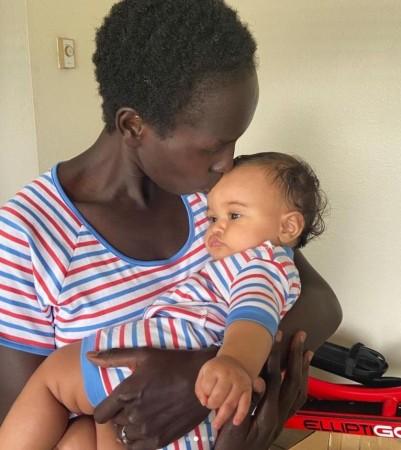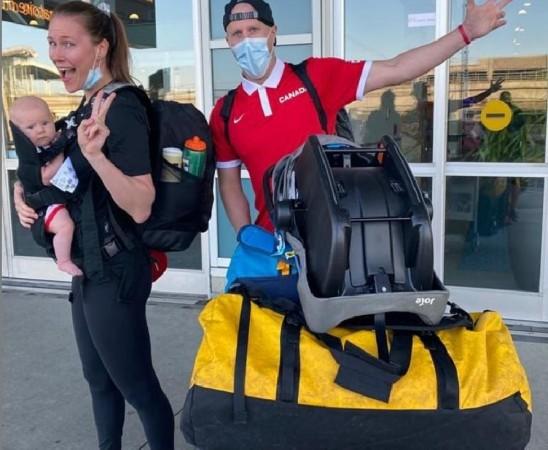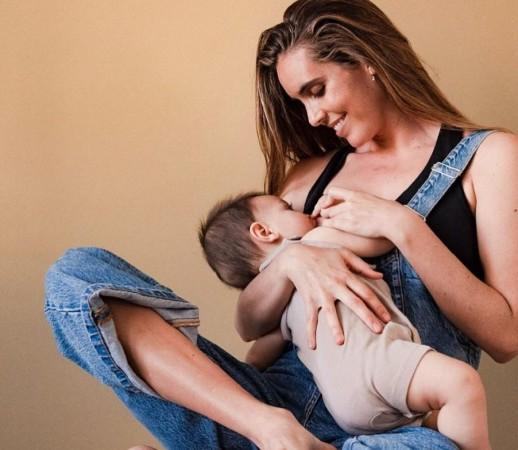21st century, billionaires are on vacay, traveling to other planets up in space, yet new mothers, down here on planet earth, have to fight the system to bring their nursing infants to work. While IOC's reversed decision on bringing infant babies along to the host country brought light to many nursing mothers, restrictions imposed may still make it inconvenient.
According to a TOI report, the 2020 Tokyo Olympic championships, falling in line with a 'gender balanced' theme, is all set to witness a higher number of female athlete representation compared to its previous events.
While China will be represented by 298 females and 133 male athletes at the games, Canada has decided to send 225 women and 145 men. Russian Olympic Committee has strong representation from 183 female athletes and 146 male athletes. Numbers for the USA stand at 329 women and 284 men. These are some of the countries with high representation at the Olympic games.
However, on one hand, while the Olympic games welcome female power on the field; on the other, it ignored the challenges that some of the women athletes especially new mothers, need to deal with while hoping to represent their country on an international platform.
Olympics not for new moms?
Last month, breastfeeding athletes, nursing babies as young as 4 months old, had to make the tough call of leaving their child behind and striving to bring gold back home.
U.S. Olympic marathoner Aliphine Tuliamuk, who won the trials last year in February, never thought that she would have to undergo the worries of choosing between caring for her newborn or running the tracks in Tokyo. Aliphine, who delivered in January this year, got back to her practice just two months after, in March. However, soon after, she was informed by the Olympics committee that due to Covid-19 restrictions, her family won't be allowed to accompany her to the games starting July.
She took to her social media account and expressed her dissent, even wrote an official letter to the International Olympic Committee (IOC).

"I had been putting off thinking about Zoe not coming to Tokyo with me for a while now, but I had to start to, at team processing a week ago in Eugene, and I have cried a lot since. I know that I will be leaving her for only 10 days, and she will be just fine and that so many other moms have done the same, but I can't even imagine being away from her for half a day," she wrote on her Instagram account.
IOC reversed 'no family' rule end of June, yet with clauses
Aliphine's effort wasn't in vain as, early July, IOC reversed its policy and 'allowed' nursing athletes to bring their children with them to the Games when 'necessary'.
The IOC statement read, "When necessary, nursing children and their caregivers are able to accompany athletes to Japan... suitable measures regarding testing and quarantine will govern their entry to the country." The statement also included, "It is inspiring that so many athletes with young children are able to continue competing at the highest levels, including at the Olympic and Paralympic Games, and we are committed to doing everything possible to enable them to perform at the Tokyo 2020 Games."
However, the diplomatic words chosen by the committee drew a lot of flak from new mothers. Soccer player Alex Morgan reacting to IOC's decision wrote, "Still not sure what 'when necessary' even means. Is that determined by the mother or the IOC?" she tweeted. "We are Olympic mothers telling you, it is NECESSARY."
New moms, fully supported or just grudgingly accepted?
Kimberly Gaucher, a Canadian basketball player and another breastfeeding mother at the Tokyo Olympics played a vital role in bringing about this crucial change. Kimberly, mother of a 4-month-old Sophie, in an interview with CBC hoped that she's helped push women's sport to the point where breastfeeding moms are fully supported, not just grudgingly accepted.

Last week, Dr. Cecilia Tomori, Director of Global Public Health & Community Health at Johns Hopkins University School of Nursing in an article with an online Health magazine said, "The restrictions should have never taken place." She added, "The research is very, very clear that breastfeeding has these profound consequences for both moms and babies. And so, interfering with it, preventing people from being able to feed their babies, is really problematic. That is why it's a public health issue. I think it's at the intersection of public health and human rights."
In the article, she also firmly stated that ignoring a new mom's needs is a very common issue. "It's a very common issue that the needs of mothers are overlooked. And breastfeeding mothers are in that group. They are essentially ignored and not even considered to be relevant to the conversation," she was quoted by Verywellfamily.
Relaxed rules, inconvenient impositions
Even though the IOC has allowed women athletes to be accompanied by their infants, the competing athletes are expected to live in a different village (in a bubble) than their families. While Kimberly doesn't mind the hassles associated with it, Spanish synchronized swimmer Ona Carbonell has taken the tough call of leaving behind her nursing infant Kai as the Japanese government's restrictions are "not compatible with her athletic performance and being with family at the same time".

In a video statement shared on her Instagram profile, she stated that her husband and child will be expected to live in a different hotel and not allowed to leave the hotel premises during their 20-day stay. "For me to go and breastfeed Kai whenever he needs it during the day, I would have to leave the Olympic villa, the team's bubble and go to their hotel, risking my team's health during the Olympic games, an objective we have been preparing for."
She further said that she hopes that other athletes can get along with the conditions and be able to take their babies with them. "Personally, I can't accept these conditions, I won't be ok, I would have to use the breast pump for 20 days."
The video posted three days ago has brought back the conflict with regard to the subject. On one hand, while nursing experts voiced their concerns in favour of Ona, many felt that it's best for kids to keep away from the country that is recording high numbers of Covid-19 cases.
Emily Hirata wrote, "This is sad. As someone who works on international nutrition programs for mothers and infants, I can confidently say that the benefits of breastfeeding outweigh the risks of COVID to mom or baby. Japan should know this and should not make it so hard for mom and baby to continue."
"I actually agree with this policy. They're going to have hundreds of foreign athletes entering a country already trying to limit exposure to COVID. They can't afford to have any unnecessary people there," another user replied.















